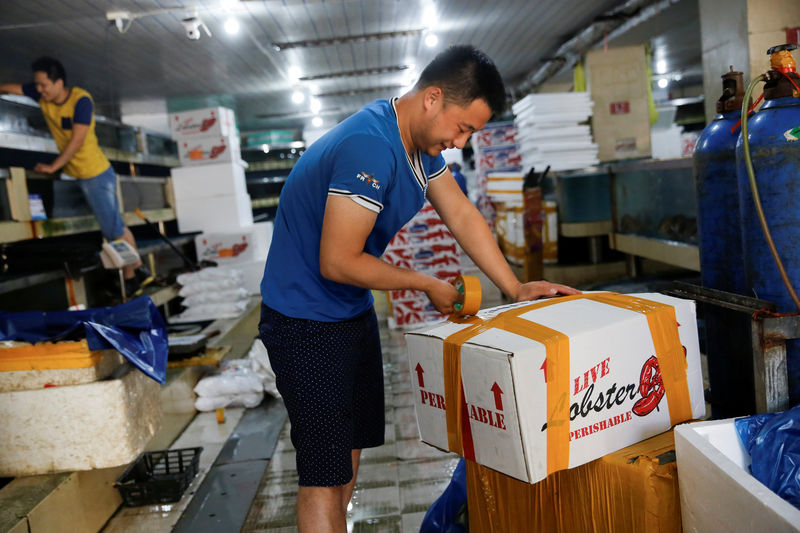By Brenda Goh and Engen Tham
SHANGHAI (Reuters) - Alex Chen, 40, an importer of U.S. wines in Shanghai, knows what it's like to be pummeled by Chinese tariffs.
His company, which sells sauvignon blancs and zinfandels to distributors in China has lost a half-million dollars in orders since China slapped tariffs in April on $3 billion worth of U.S. fruits, nuts and wine.
A much larger group of U.S. companies and traders selling American goods in China is bracing for a similar blow as the world's second-largest economy prepares to impose tariffs on another $34 billion of American imports on Friday.
The experience of Chen and others like him offers a stark warning of what may be in store for importers of everything from cars to seafood, among many other items on China's list of 545 American products that will face an additional 25 percent levy.
"We've had close to $500,000 in cancellations already... it's about a quarter of our business. It's pretty significant," said Chen, managing director of Alexander Wine Co, which has been doing business in China for almost a decade.
He added that Chinese buyers, worried about costs, started to cancel orders on April 2, the day the first round of tariffs kicked in.
"Everyone is holding off to see what happens with this tax, whether it's repealed, or if there's a better solution. Overall it's hurt our business," Chen said.
China's next round of tariffs focuses on American-made consumer products. The overall value mirrors U.S. tariffs, which also are set to kick in on Friday.
The escalating exchange of tariffs could mark the start of a larger, destabilizing trade war if Washington and Beijing cannot resolve their differences, including concerns in the United States about unfair Chinese trade practices.
President Donald Trump's administration has threatened successive waves of duties on up to $450 billion in Chinese imports. China has said it will not back down, although it has fewer U.S. imports to target.
"If the United States decides to escalate these tensions, everyone is going to get caught up, and it's going to be pain across the board," said Nick Marro, Hong Kong-based analyst at The Economist Intelligence Unit.
'POLITICAL DANCE'
American businesses and industry lobbies, including the U.S. Chamber of Commerce, have criticized Trump's trade dispute with China, saying it will hurt businesses that already face greater competition from local rivals.
Richard Morgan, chief executive of business advisory Equus Global Associates and a distributor of California dairy and Georgia pecans in China, told Reuters he was absorbing the impact of the April tariffs, reducing his profit margin to preserve market share and keep customers.
"We've just got to hang on," he said. "The sad part for us is while this political dance is playing out, our business may be taking a hit. But hopefully it'll blow over quickly."
U.S. producers of pork, fruit and nuts - on both the April and July lists - may be hit the hardest, with pork now facing cumulative import duties of 71 percent. At least one pork producer has said it could be put out of business.
Chinese retailers told Reuters they probably would raise prices or spurn U.S. imports for domestic substitutes, which could eventually hurt their businesses.
"If these tariffs are added, then we will definitely have to adjust (our prices) a little," said Zhao Yanmei, an assistant manager at a branch of Jenny Lou's international supermarket chain in northeast Beijing. "If customers feel that the prices are very high after the adjustments, then sales will go down."
Gao Han, a salesman at Beijing Chaoxing Seafood Company, which sells U.S. lobsters, said that his firm was stocking up before the tariffs hit, but that if the issue persisted they'd have to raises prices or shift supply.
"There's nothing we can do if there's a trade war," Gao said as he showed off the firm's imported lobsters amid tanks of seafood at its Beijing store. "All we can do is adjust our supply chain here depending on the size of the price increases."
How much consumers are willing change their behavior because of the tariffs will shape which businesses suffer most.
"If prices rise, I will look for alternatives to imported U.S. fruits and food products," said Zheng Yuxi, a 26-year-old publicist in Shanghai. "I can buy home-grown apricot kernels instead. As for fruits that are not widely grown in China like blueberries, I can simply opt for other fruits."
